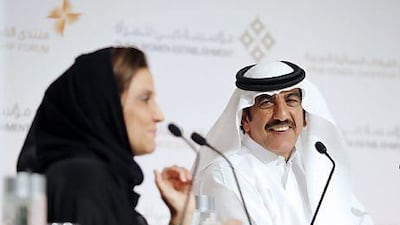Like many children who come from business families, Amna BinHendi spent a year after her graduation working for a government company to gain experience before joining her father's conglomerate, BinHendi Enterprises.
"Who could you trust better than your family?" Mohi-Din BinHendi, the president of the company and Ms BinHendi's father, said at the third Arab Women Leadership Forum in Dubai last week.
But for family enterprises promoting their own children, he adds: "It is important to have capability. It should be based on education and experience, it cannot be emotional".
At 29, Ms BinHendi is the chief executive of BinHendi Enterprises and one of the few Emirati women in a position to take over a family business.
The attitude of patriarchs and Sharia law are two challenges facing women hoping to make it to the top of a family business.
The number of Emirati women who have taken control of a family business is "not big at all", says Diana Hamade, an Emirati lawyer who founded International Advocate Legal Services in Dubai.
"Raja Al Gurg and Fatima Al Jaber are the only women in the UAE who have gone public with their active engagement in their fathers' businesses while having their brothers on board with much less active roles."
Ms Al Gurg is the managing director of Easa Saleh Al Gurg Group, based in Dubai, while Ms Al Jaber is the chief operating officer of Al Jaber Group, based in Abu Dhabi, and executive director of the company's board.
Al Gurg Group, which was formed in 1960, has 23 companies under its umbrella, spanning the retail, trade and manufacturing sectors.
Al Jaber Group started in 1970 with a focus on construction and has diversified into shipping and transport.
One way to encourage participation of women in the family business is to have a family office, also known as a family assembly or a family board.
It is an informal governance structure adopted by businesses to enhance relations between members of the family. "It is important for the family office to teach the young generation the values and history of the family business," says May Makhzoumi, who chairs the Makhzoumi Foundation, a Lebanese non-profit organisation established in 1997 by her husband Fouad Makhzoumi.
The family office also helps to protect the business interests of the family and female shareholders.
There is, however, a reluctance among some businesses to allow female family members to join their boards.
"Some still doubt that women can be equal to men," said Mr BinHendi, whose three daughters work in his business.
Aisha BinHendi, 26, is the chief operating officer of the group, and Aziza BinHendi, 25, is the vice president of the group's retail fashion department.
"There is also a cultural ego that nobody should see my daughter," says Mr BinHendi.
To overcome this, a recalibration in attitude is required.
"The culture will have to change," says Ms Hamade. "Education for men is necessary too."
While some people such as Mr BinHendi believe Sharia law protects the rights of women in a family enterprise, Ms Hamade disagrees.
According to Islamic law, everyone is allotted a specific share in a business and women inherit just half their brothers' shares. This can mean women control less of a company, and perhaps makes them less inclined to participate in its affairs.
This leads "some [shareholders] to buy out some [of the others] or everyone to sell and go", says Ms Hamade.
As for Mr BinHendi, he says that the daughter who is the brightest and shows the most interest in the company will be in charge of the group.
"The father-daughter relationship never stops, but the chairman takes over during business," he says.

